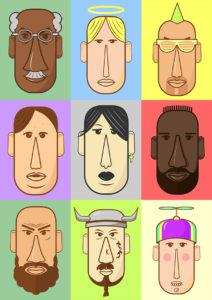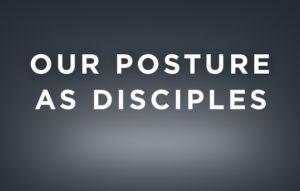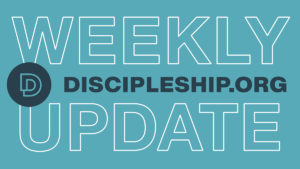Discipling the Mind, Cultural Chaos, and Critical Theory

There is a lot happening under the surface in our culture.
“I do not understand what is happening in our world . . . I do not know what to think . . . or who to trust?”
I have heard those words repeated to me in private conversations too many times to count.
Who can guide us through the chaos? . . . There are conflicting narratives . . .
A narrative is a story . . . we have grand narratives and personal narratives. For a believer, the grand narrative is God’s story for humans in history . . . and our personal narrative is tied up in our conversion and discipleship—the spiritual stories of our lives.
Chaos is created by narratives that are in conflict with each other . . .
In the political realm—The news reports and social media posts on the right live in a different world than the news reports on the left. It is like they are from two different planets in terms of how they look at most issues. For example, does Trump deserve to be impeached and removed, or is it that the FBI leaders on the seventh floor tried to stage a coup to overturn Trump’s election?
On the question of global warming—How bad is it? How much is being caused by human beings? Is Miami, Florida soon to go under water? Is it fair to even ask questions about it since so many scientists have already definitively answered these questions? What about the scientists who see it differently?
The COVID-19 risk—It was going to kill 2 million Americans and we needed to shut down the country to save the country. Did we really only need to flatten the curve and then just be careful? Should we continue to greatly restrict people, or should we open things up? Was it all just a big manipulation? How should we even think about the upcoming vaccines?
Then we suddenly stopped talking about COVID-19 because everything is now about race relations.
Race relations—What is happening? Lots of people are protesting and others are apologizing, but is it going too far? How real is “white privilege”? Why have so many been blind to it? How can our country still be so racist? Or do the facts actually show that we have made progress and our structures are not as racist as people are saying?
How come this is such a cultural flashpoint all of a sudden? How do these conflicting narratives work in discipling relationships and in the church?
Consider this post as a narrative to the conflicting cultural narratives in America.
There are five angles that can guide us.
1. It Is all about the Spiritual Battle for Your Mind.
This first point is a bigger deal than most people realize. What we believe and think is the biggest determiner of what we will do. Let me state it slightly differently: what we truly think and believe and value will determine our actions. This is why the Bible describes spiritual warfare as a battle in our minds.
Paul describes it in 2 Corinthians 10:3–5. He writes, “For though we live in the world, we do not wage war as the world does. The weapons we fight with are not the weapons of the world. On the contrary, they have divine power to demolish strongholds. We demolish arguments and every pretension that sets itself up against the knowledge of God, and we take captive every thought to make it obedient to Christ.”
Here is what Paul, under inspiration, teaches us in these passages:
- Disciples do not fight battles like the world fights battles.
- Disciples have divine power to use different weapons.
- Disciples demolish spiritual strongholds by taking captive every thought to make our thinking obey Christ.
What does that mean? The battle is a battle in the mind.
What do we think? What do we believe? Is our world of thought captive to Christ?
Charles Malik described it well:
“You may win every battle, but if you lose the war of ideas, you will have lost the war. You may lose every battle, but if you win the war of ideas, you will have won the war. My deepest fear and your greatest problem is that you may not be winning the war of ideas.”
Discipling people into the ways of Jesus is to disciple minds.
The average person today is locked in their social media bubble for five to seven hours a day being discipled by the narrative of the world—add to this the pressure from Human Resource departments, sensitivity training, common literature, and peer pressure.
There is no way an hour or two of church each week is going to out-disciple the world.
We need war plans for discipling the mind.
Without going into all that is involved in a war plan or a battle for minds in a short post, let me share the foundation which guides what I think, believe, and value:
- God has spoken to the world definitively in Jesus Christ.
- The sixty-six books of Scripture are Jesus Christ’s teaching and his final authority for truth.
- The earliest church fathers (up to 325 AD) are the best reference point as a secondary reference to what the apostles taught because 1) they were discipled by the apostles, 2) they led in churches created by the apostles, and 3) they had the same language and culture as the apostles.
- There is a great centralizing tradition with 2,000 years of Christian thought on the diverse teaching of Scripture—what C.S. Lewis called “Mere Christianity”—and it is a very helpful guide for us today.
- A post-modern, post-truth culture requires in-depth engagement (with the tools listed above and prayer and fasting).
This foundation is very important because it is the basis by which I seek to help people work through issues in an age of confusion.
It is a tradition with wise, factual, and thoughtful resources that helps with the following:
- political questions
- scientific issues like global warming
- medical problems
- race, gender, and class struggles
In an age of chaos, wise, godly people who are rooted in Scripture and historic Christianity have much to offer, but only if they are willing to enter into the battlefield of the mind in discipling relationships.
We must enter into the battle with people (and for people) and grapple with the hard questions.
2. It Is a Worldview Conflict.
A worldview is a particular philosophy of life or conception of the world. Worldviews are all-encompassing—typically guiding how people think about every issue.
As a society we are in the midst of changing our worldviews. It is the biggest underlying reason for the daily battles we are witnessing in public spaces, to the left and to the right in the United States.
Think of an iceberg. What is on the surface?
 We are seeing lots of things on the surface from the public narratives about the environment, public health, politics, and race. They are the tip of the iceberg narratives.
We are seeing lots of things on the surface from the public narratives about the environment, public health, politics, and race. They are the tip of the iceberg narratives.
But what is happening underneath?
Some say that 86% of an iceberg is under the surface. That percentage serves as a good metaphor because most of what is going on publicly today reflects stories and beliefs that are much deeper in the water. The tip of the iceberg did not sink the Titanic, it was the bigger part that was under the water. I am going to greatly simplify the contrasting worldviews to explain what I see happening. To keep it simple, I will only provide three reference points.
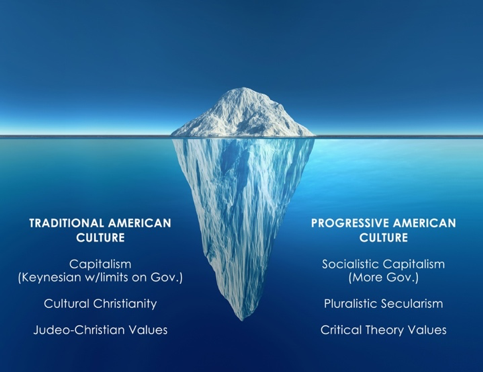 Yes, I am indulging in an oversimplification. But oversimplification is better than chaos.
Yes, I am indulging in an oversimplification. But oversimplification is better than chaos.
And hold off for a minute so that I can explain “Critical Theory” below (it will be worth it).
Here is how it looks on the surface when it comes to the practice of Christianity in America. The following graph is from the Barna Group. They are a respected research organization whose focus is the state of Christianity in the United States. Their stats will help you to see what is happening under the surface. Please carefully notice the red line.
 This is a shocking chart. As senior V.P. Brooke Hemphill pointed out in our recent National Disciple Making Forum, we are witnessing a radical shift away from the practice of Christianity in North American culture.
This is a shocking chart. As senior V.P. Brooke Hemphill pointed out in our recent National Disciple Making Forum, we are witnessing a radical shift away from the practice of Christianity in North American culture.
In ten short years America has moved from being a nation where 50% of the people claim to be practicing Christianity, to a nation where only 25% make that claim. Again, in sociological terms, this is a shocking change in a short period of time.
Understanding this trend helps us to make sense of the narrative of all those former Christian celebrities (typically musicians and singers) who, on an almost weekly basis, are announcing their doubts and then their deconversion from Christianity (click here for more).
Their minds have been discipled to believe a different narrative.
Millions are joining them.
3. Racism Is an Ongoing Sinful Reality.
I want to talk about a big (under the waterline) factor in American public discourse. The race conversation today is difficult. But it is often formed by factors that are under the surface. American culture, like all cultures, has been racked by besetting sins. A besetting sin is one to which we are peculiarly exposed, and into which we most easily and most frequently fall.
Racism is one of Americas big besetting sins.
Go back 150 years ago (and hundreds of years before that) and try to wrap your mind around the enslavement of a people based upon the color of their skin. Think about all the injustices, brutalities, rapes, and murders. The Civil War was an important event that helped address the system of slavery. But then think about lives in America from the Civil War to about sixty years ago. Racism was a terrible daily injustice. Just yesterday I read Martin Luther King Jr.’s “Letter from a Birmingham Jail.” The conditions and reality that he describes from sixty years ago are still unfathomable to me. The racism was so terrible. We are grateful for the progress made through the Civil Rights movement.
But in many ways those realities are still with us.
“Yes,” we have made progress, but “no,” we have not made enough progress.
And the spiritual roots of racism and the breakdown of the nuclear family in the black community are issues few church leaders and churches have been willing to fully address. We need Spiritual giants. We need new Martin Luther King Jr’s for the twenty-first century.
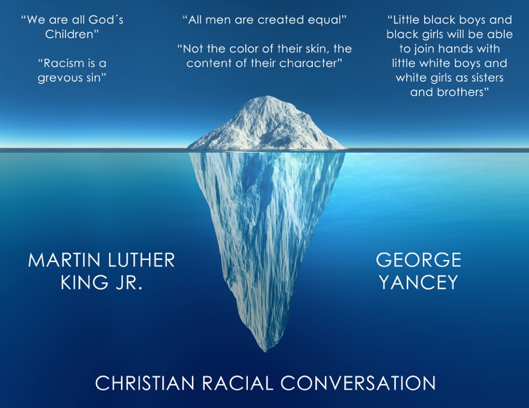 A Black man in my church described the ongoing need for God to help us with racism this past Sunday…
A Black man in my church described the ongoing need for God to help us with racism this past Sunday…
My wife Marta & I have been involved with Harpeth for over 16 years. We’ve developed some great friendships over those years and for that we are extremely grateful. I’d like to thank Bobby, Doug, and the elders for the opportunity to share my thoughts about recent events with you this morning.
Now, some of you have probably heard the names Trayvon Martin, Breonna Taylor, and recently George Floyd. They were all victims of senseless killings over the last few years. But there is one name that I doubt you’ve heard. On Monday I talked to my mother and she gave me some very sad and distressing news. She said that my youngest sibling, my brother Jamie, came over Sunday night to help her and my sister with a few things around to the house. My mom told me she felt this strange fear in her spirit. She begged my brother to stay or to at least allow my sister to drive him home. You see, there was a peaceful demonstration in Louisville that evening and a curfew that had been issued for later that night. My mom was afraid something might happen to him. She tried several times to convince him to stay, but he kept insisting that he would be okay. He left the house that night and several minutes later, they heard shots ring out. My mom tried to contact him for hours, but there was no answer.
Can you imagine how my mom must have felt? How are you feeling right now?
That is what we as black people often feel whenever we are pulled over by the police or hear that there has been another police shooting. You’re wondering if your officer is a good or bad one. You’re wondering if the shooting involved a family member or friend. It’s an extra stress that no one should have to feel, and especially not as often as we do.
Unfortunately, this time, the shooting did involve a family member.
A couple of hours later my mom heard from Jamie, but there was still bad news to be delivered. My stepbrother David McAtee had been shot and killed. David owned a barbecue restaurant, and to quote the mayor, “was well-known and well-liked by the community.” He was simply there providing food; some reports say even to the police officers themselves.
Shots rang out from somewhere and two police officers are reported to have shot him. I would have thought it was a very tragic accident except that for some strange reason, the officers had turned off their body cameras.
The police chief was fired the next day, but he had already put in his retirement papers. Now, before I go any further, let me say that from my years as an officer, I know that there are far more good police officers than there are bad ones. But I also know from my experiences as an officer that racial profiling and certain biases do exist.
Now, I could talk about racial profiling and my experiences with it, but for time’s sake I’ll skip over that, and the hundreds of times I’ve been called the “N” word from elementary school, to Vanderbilt, and on into adulthood. I wish I had time to tell you about how the KKK put a bomb in my elementary school. Only God knows why it didn’t go off. I’ve also been through two race riots and come out of both unscathed . . .
In closing, I mentioned that the KKK had placed in bomb in my elementary school. Years later I met a brother in a sister church in Louisville. Our families became friends and we often spent time together whenever we would come to visit my mom in Louisville. He confessed to me that he had been a member of the KKK before becoming a Christian. Can you believe that my family has spent the night, and on more than one occasion, in the house of a former KKK member? And a former KKK member opened up his house to my interracial family. Something like this can only be done by the grace and power of God! And only in the kingdom of God!
Brothers and sisters, I’m here to tell you that there is an answer to our nation’s problem. But it won’t happen strictly through legislation and good will. And it’s surely not going to happen by becoming more divided. Only God has the power to bring true healing to our nation, but only if we have the humility . . . . If we will do our part, God says He will do His part and He will heal our land. Thank you for listening, but I truly hope that you heard me this morning.
I asked the church to sit in their thought for a minute as Eric was crying in front of them. His horrific experience is the experience of a multitude of African Americans and Latinos today.
It is not okay and we need Christian voices to speak out clearly about racism and the alternative in Jesus. But Christian voices are not the dominant ones today . . . instead the racial dialogue is coming from voices who have a philosophy that is not based on Scripture.
The voices are describing race—and many other issues—from the foundation of a neo-Marxist, atheistic philosophy called Critical Theory.
Let me explain how it has become the dominant voice.
4. Critical Theory Is Gaining Strength as the New National Philosophy.
I know . . . my friends have begged me not to talk about Critical Theory. After all, what is it? Who even understands it? What difference does a philosophy like this one really make anyway? Remember how we started this post with what the apostle Paul said in 2 Corinthians 10:3–5? He taught that spiritual warfare, at heart, is a battle for the mind!
Critical Theory is where the battle for minds in America is centered today. It is emerging as the new dominant philosophy for the United States. It is the dominant philosophy in our schools, media, entertainment, HR departments, and in secular discourse.
You cannot disciple the minds of people in North America today if you do not understand Critical Theory. Please read that last sentence again. Critical Theory is pervasive in American culture (and the West), but few understand it. The simplest introduction I can find is provided by Neil Shevni—click here. I encourage you to follow his short, easy-to-follow summaries.
Remember my tip of the iceberg comments? Surely you have heard some of these statements?
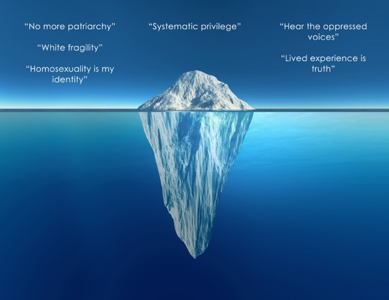 Those words are not obscure statements. They reflect a transition to a secular America. Critical Theory is providing more and more people with the foundation for how to think, what to believe, and what to value (as a worldview). Truth be told, most preachers and church leaders do not understand what is happening. The minds of their people are being discipled into this philosophy. It is a secular philosophy based upon neo-Marxist ideology and atheism. Unwittingly millions are embracing the new narrative, and after a while, they find that it is not compatible with a Biblical worldview.
Those words are not obscure statements. They reflect a transition to a secular America. Critical Theory is providing more and more people with the foundation for how to think, what to believe, and what to value (as a worldview). Truth be told, most preachers and church leaders do not understand what is happening. The minds of their people are being discipled into this philosophy. It is a secular philosophy based upon neo-Marxist ideology and atheism. Unwittingly millions are embracing the new narrative, and after a while, they find that it is not compatible with a Biblical worldview.
For decades Critical Theory has been gaining steam and it is now dominant in American universities (especially in humanities and the sciences). The next diagram shows what is happening under the waterline.
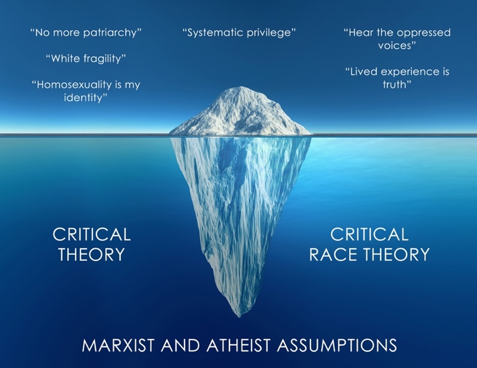 It is a massive societal trend—more and more you will find that Critical Theory is becoming the foundation for law, education, health, psychology, Human Resource Departments—and for all of public life in America. Critical Race Theory is a subset of Critical Theory.
It is a massive societal trend—more and more you will find that Critical Theory is becoming the foundation for law, education, health, psychology, Human Resource Departments—and for all of public life in America. Critical Race Theory is a subset of Critical Theory.
Here are some of the expressions that typically reflect the way of thinking and believing that springs from Critical Theory.
- We need to eliminate various forms of social oppression—in “gender, race, ethnicity, religion, sexual orientation, physical or mental ability, or economic class.”
- There is systemic oppression in the United States—women, immigrants, people of color, LGBTQ people.
- We need change—“no more patriarchy,” “no more systemic privilege.” We must reject and re-educate those with “white fragility,” “gender advantage,” “homophobia.”
- We need to honor “a person’s lived experience as truth,” and reject the ideas of “old white men,” or our “sexist society.”
Please note one thing . . . Critical Theory provides some very helpful insights about race, gender, oppression, etc. For example, the book, White Fragility shines light on aspects of racism that are greatly beneficial. Everyone who reads it will find it to be very helpful in the quest to be less racist.
But for the uninformed, it is a Faustian bargain. The book helps you to see things, while it is discipling you into a neo-Marxist, atheistic worldview. Many will gain some knowledge, and all the while it will influence them down a path by which they will lose their souls. Too many people do not realize how their underlying views about life are subtly changed in the process of the constant bombardment with subtle narratives based upon Critical Theory.
Church leaders have a divine obligation to help their people to understand how to interpret this philosophy.
Again, please check out Neil Shevni’s introductory video (click here) or written post on Critical Theory (click here) or an interview with the Christian apologist William Lane Craig (click here) as starters for education on this topic. Michael Walsh’s book, The Devil’s Pleasure Palace: The Cult of Critical Theory and the Subversion of the West is a sustained look at Critical Theory and its influence over the last few decades in America.
Countless numbers of my friends who take the time to wade through Shevni’s video or the transcript (of the same presentation) tell me that now they understand, for the first time, what is happening in the world as they see it unfolding.
Those who follow King Jesus must simply pursue his grand narrative, which is a different grand narrative.
5. Discipling the Mind Is Essential.
Let me come back to focus on an essential strategy that we must adopt as church leaders and disciple makers. Discipling the mind is what the apostle Paul described in 2 Corinthians 10: 3—5. We are seeking to take captive “every thought and change our thinking so that our minds obey Christ.” What does that mean?
- Our purpose in life is defined by what Jesus says.
- Our view of our identity is defined by what Jesus says.
- Our views of everything are defined by what Jesus says . . . on gender, money, race, sexuality, economics, and immigration.
Our job as disciples is to conform our minds to God’s truths in Christ. Our job as disciple makers is to help others conform their minds to God’s truths in Christ.
Now think about it for a minute—who is discipling the minds of our children today? Who is teaching them what to think and believe? The answer: secular schools with foundational beliefs formed by Critical Theory.
It is not an out-and-out conflict with Christianity, but it is a subtle and powerful slow melding. Concepts on sex, science, economics, gender, race, etc., are presented to our children in high school and university, but these concepts do not align with what the Bible teaches.
It becomes a tension—they think one way at school or at work—and then there is a different view at church or at home. But over time the dominant view of the world—increasingly based on Critical Theory in its various forms—seduces them and trains them in how to think. They wake up one day and they no longer believe what their parents and church uphold.
They have been discipled to think the way the non-believing world thinks.
Neil Shevni created the following simple and short diagram to contrast the two systems.
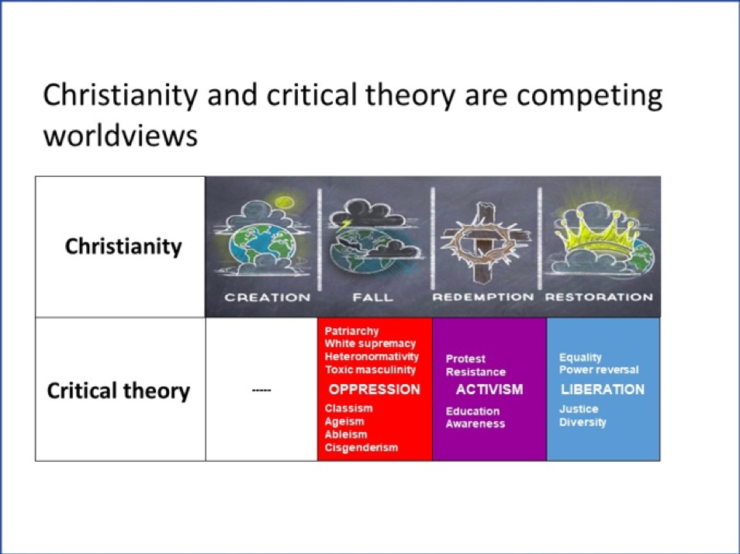 More and more pastors and leaders are realizing that there is something big happening. They sense that we need to do a better by discipling the minds of people and helping them combat the influence of a secular world. But their minds remain fuzzy.
More and more pastors and leaders are realizing that there is something big happening. They sense that we need to do a better by discipling the minds of people and helping them combat the influence of a secular world. But their minds remain fuzzy.
Notice the top three concerns of pastors in the recent Barna survey.
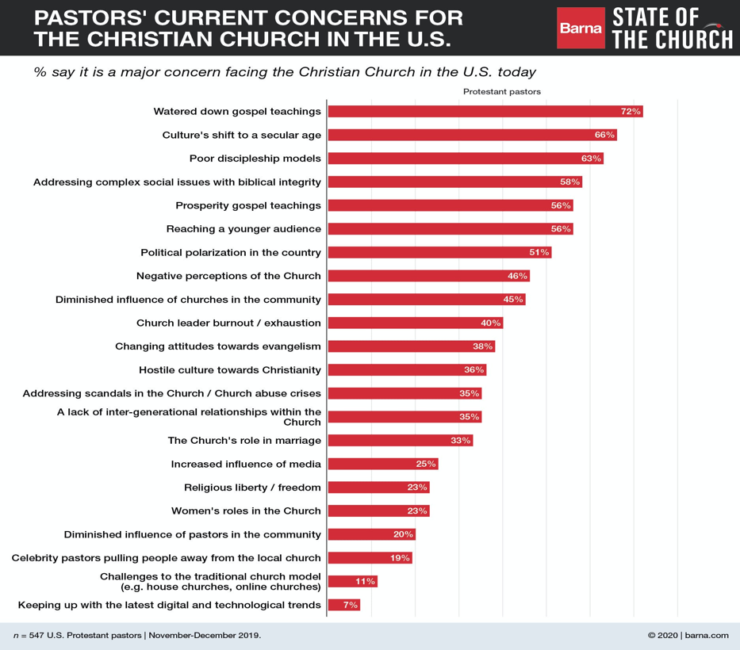
The instincts of American pastors are right. Notice the top concerns. We have to help people to 1) understand gospel teachings (the teachings of Scripture), 2) resist a secular culture and 3) get better discipleship models.
We have talked about Biblical or gospel teaching and we have talked about helping people resist a secular culture, but let me close by pointing out something about the desire for better discipleship models. There is a lot that I can say on this point because that is our focus at Discipleship.org.
I will be brief. I will highlight one important paradigm or model contrast that I believe is necessary for moving forward.
6. Jesus-Style Disciple Making Is Crucial.
Jesus did not disciple people the way churches have discipled people in recent Protestant history. There was too much focus on the classroom alone. In fact, we prefer the term “disciple making,” and the qualifier “Jesus-style disciple making,” to help us focus on doing what Jesus did with his disciples.
We encourage church leaders and disciple makers to replicate Jesus’ method. Please do not focus on the classroom only. Please do not focus just on educational discipleship.
We contrast educational discipleship with Jesus-style disciple making in the follow chart. It is a diagram adapted out of the book that I wrote with Josh Patrick called, The Disciple Maker’s Handbook (Zondervan, 2017):
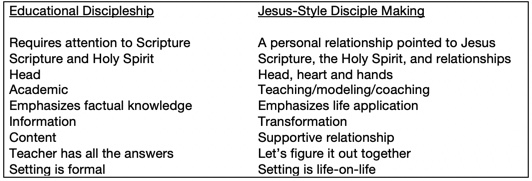
Too many people think the answer is more Biblical education alone. That will no longer work. Our society has changed too much. People need life-on-life discipling relationships. They need knowledge AND relationship AND application.
Yes, our point is that people need to study the Bible more.
But people also need relationships to process the truths of Scripture. They need personal mentors, personal coaches, and personal guides. Information by itself is not enough. We are drowning in a sea of information but starving for discipling relationships.
Sermons from the pulpit are needed, but people need more than just public sermons. Think of it this way, especially as you think about difficult religious and moral conversations today: “distance breeds mistrust; proximity breeds trust.”
The way Jesus discipled his disciples is our best path forward.
Jesus is our model.
And that is the conversion which those of us who come together through Discipleship.org focus on every day.
I hope you will join this conversation with us.
Bill Hull (The Bonhoeffer Project) is joining with me and several other national leaders for conversations around disciple making and Critical Theory. If you are interested in joining the conversation, email [email protected].
If you have enjoyed reading this, please consider joining our email list!








